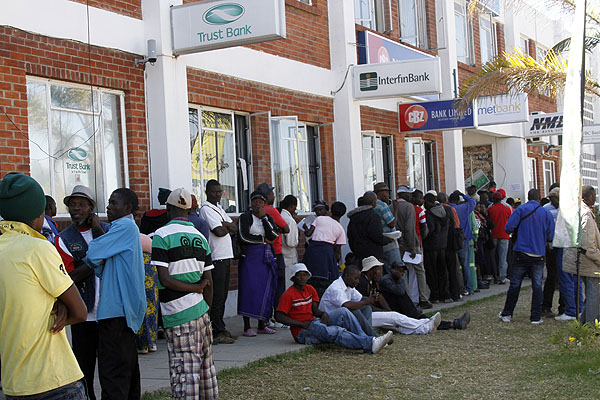
Many bank clients are decrying the notion that bank charges are high in Zimbabwe. In fact, it has been mooted that most banks in this market generate a significant portion of their revenues from bank charges alone. Several important questions have been asked of banks — are these bank charges justified?
Clive Mphambela
How are they determined?
Should banking be a free service? What can be done so that the public can enjoy the convenience and security of formal banking services at lower costs? We attempt this week to start a dialogue aimed at understanding why, if at all, banks have to charge for their services.
What are bank charges and how do they affect your relationship with the bank?
The term “bank charges” refers to all forms of levies and fees recovered by a banking institution from their customers. Banks do this primarily to cover their costs of providing services. Bank charges thus take many forms.
They are charged on a once-off basis if they relate to a specific commission or payment transaction, or they may be recurring in nature such as monthly account maintenance fees, stop orders or debit orders.
Banks also occasionally charge customers when they exceed pre-agreed transaction or overdraft limits, as well as for making special payments on behalf of customers.
- Chamisa under fire over US$120K donation
- Mavhunga puts DeMbare into Chibuku quarterfinals
- Pension funds bet on Cabora Bassa oilfields
- Councils defy govt fire tender directive
Keep Reading
What are some of the reasons banks have to charge for services?
The first and most important aspect of banking is that it is a business activity based on the concept of financial intermediation. Banks act as intermediaries between savers and borrowers; accumulating deposits, pooling them together and on-lending these to borrowers that need them.
Banks also act as payment intermediaries, facilitating transactions between different people separated in time and or space, by making payments on behalf of customers to their creditors or other beneficiaries.
Banks also serve as repositories or safe stores for one’s savings — a place where one can keep their money safe until it is required at a later time.
In all these activities, banks are playing a fiduciary role as well as an intermediary role. Banks are also a source of advisory services, risk management services and other services such as trust services.
As such, it is natural that banks charge their customers for “business” purposes. The main reason for charging for services rendered is simply to recover the costs of operations and to cover the economic costs of providing the banking services.
The second purpose of bank charges is to modify their customers’ behaviour towards desirable behaviours. Penalties can dissuade customers from engaging in undesirable activities.
Why do banks have to recover costs from their customers?
We have already mentioned that banks are in business. They thus have to face business costs together with all the attendant challenges of running a business enterprise in Zimbabwe.
Banks have to pay wages and salaries to staff. They have to pay rents for their premises.
They have to make payments for utility services such as electricity and water and buy fuel for generators when electricity is not available and so on.
We are in an environment where power supplies are erratic but bank systems have to be kept running 24 hours a day, seven days a week and 365 days a year. This means that banks have to operate their systems using alternative power sources when normal power is not available.
Bank customers will not tolerate a bank whose systems go down whenever the power mains is cut off.
They will still demand full-fledged services from ATMs, even after hours. A lot of expenses happen behind the scenes, that need to be paid by the bank, even as customers sleep.
What are the costs of providing cash to customers?
Since the adoption of the multi-currency system, banks are responsible for importing cash into the country for the banking public. There are significant costs that are involved in importing cash into the country and these are currently being borne by the banks. Some of these costs have to be shared with the bank clients.
These costs include; transport and shipping costs for the cash, insurance for the cash in transit and payments for security of the cash.
The banks need to recover part of these costs, hence they include them as part of the bank charges whenever cash is exchanging hands between the customers and their banks. This largely explains why banks charge for cash withdrawals.
Why charge for cash withdrawals when a customer has also banked cash only a few days before?
When a customer brings cash to the bank, it has to be counted to check that it is in fact good money and not fake etc.
The money has to be bulked up with money from other customers, sorted for quality of notes etc. Soiled and torn notes are removed from circulation and have to be exported at a cost to the USA so that they are replaced with new notes.
All these handling costs add up to the cost incurred in the process of making cash available to the consumers. Whenever one gets money from the bank, they expect clean genuine notes, not spoilt dirty notes or fake money. Banks invest huge amounts of time and effort in making this happen.
Banks also take measures to protect not just clients’ money, but the clients themselves when they visit the bank.
Thus the costs of maintaining security at ATMs, which need to be monitored 24/7 throughout the year, and other measures meant to protect bank customers as they visit branches, are all services that need to be covered for.
So why should clients bank money with banks, if it is so costly?
This is the important question, and we will deal with it in the next article. Why should we rely on banks to do all these things? What alternatives do we have? Can these services be delivered more cheaply, more conveniently? Let us discuss next week.
Clive Mphambela is a Banker. He writes in his capacity as Advocacy Officer for the Bankers Association of Zimbabwe (BAZ). BAZ expressly invites other stakeholders to give their valuable comments and feedback related to this article to him on [email protected] or on numbers 04-744686, 0772206913.











